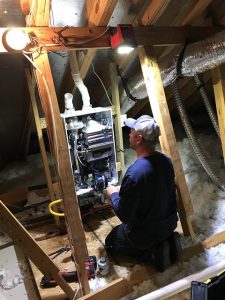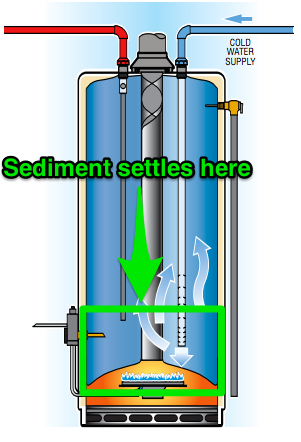Water Heater Installation Cost
How Much Does It Cost to Install a Water Heater?
A water heater is an essential appliance in any home, serving to heat water for things like bathing, showering, cleaning, and cooking. They come in various shapes and sizes, including tank and tankless models, as well as electric and gas-powered heaters. The size, type, and functionality of a water heater all have an impact on its price, and homeowners should consider all their options before making their decision on which water heater to purchase.
On average, installing a water heater costs $600-$1,500, with the average customer paying $1,000 to install a whole-house, 50-gallon tank water heater for a 4-5 person household.
Water Heater Costs by Type
There are several types of water heaters, including standard tank heaters, tankless heaters, hybrid heaters, and solar-powered heaters. They vary in size and functionality, but all do the same basic thing: heat your water. The total cost of your heater varies depending on the type you buy, and different types can be easier to install and maintain and have varying lifespans and features. All the heaters, except solar heaters, can be powered electrically or by gas, and the power source also has an effect on the final price. The table below shows the four main types of water heaters, along with their average prices.
Tankless Water Heater Cost
A tankless water heater is one that does not have a large tank to store the hot water. Instead, they heat the water as you use it, making them more energy-efficient overall. One of the advantages of a tankless water heater is that it is much smaller, taking up less room in the house and being easier to install. Buying a tankless water heater costs between $200 and $1,200 on average.
Tank Water Heater Cost
A tank water heater is the most traditional kind of water heater, found in many homes around the world. These heaters come with a large tank that stores and heats the water in advance, allowing you to turn on the shower or faucets and slowly drain the hot water out of the tank. On the plus side, they provide a large supply of hot water instantly, but on the downside, the tank needs to be refilled after emptying. Costs for tank heaters range from $340 to $1,500, on average.

The Average Life Expectancy for a Tankless Water Heater
How Long Will My Tankless Water Heater Last?
Like a lot of things, the answer is, “It depends.” Manufacturers can only predict a unit’s life expectancy based on normal usage and average upkeep. Tankless water heater maintenance requirements are not owner-intense, but they are very important.
When you do the math, tankless water heaters are a better investment for your budget and your planet. Conditions that affect the longevity of your tankless water heater include:
Water Quality – Hard water is exactly that: tough on appliances and plumbing systems throughout your home or office. It can reduce a water heater’s lifespan by 2 or more years!
Location – Water heaters located in garages or crawl spaces have to work harder to heat the water.
Whole-House Solutions
For a limited time, Plumbing Services is offering $100 off a water heater for your home or business.
Water Heaters
What Types are Available?
When it comes to water heaters, there are to main types: conventional and tankless. Both are powered by gas or electricity, which means they suit most homes. Conventional models store hot water in the tank for daily use, while tankless versions heat the water only as needed. Conventional water heaters are affordable and easy to install, while tankless models are energy efficient and may last upwards of 20 years.
How Should I Maintain My Water Heater?
All water heaters require some level of routine maintenance. You should periodically drain your conventional tank since sediment tends to collect over time and contaminate your water supply. Simply attach a regular garden hose to the valve and let the hot water flow into a nearby gutter. This will ensure that your hot water remains clean and sanitary throughout the years.
What Can I Do to Save Money on Utilities?
There are several things you can do to keep your monthly energy expenses to a minimum. For instance, keep your heater’s temperature as low as comfortably possible for baths and showers. Invest in an energy efficient system that is designed to help you save money.
How Often Do I Need Inspections?
It’s a good idea to allow the professionals to inspect your water heater once a year. During the inspection, your plumbers will check all of the parts and components, such as the thermostat, plumbing joints, and supply valves, anode rod to make sure they function properly. Your plumbers will also ensure your heater isn’t causing gas leaks or fire hazards.
WATER HEATERS
Hot water heaters are wonderful devices. We count on them every day, but when they stop functioning properly your family is severely inconvenienced. They are also complicated which means repair or replacement should be done by experienced, licensed plumbers
Do it yourself attempts can lead to serious problems such as electrical shock, gas leaks, water damage, carbon monoxide leaks and explosions. Don’t take chances which could cause property damage and bodily harm.
Correctly connect your hot water heater to gas or electricity
Secure all proper licenses and permits
Arrange for and secure all required inspections
will receive prompt, professional, courteous and price-competitive service from experienced, licensed plumbers.

Things That Can Cause Your Water Heater to Burst
Sure, that’s scary. But will it happen to you?
If you have the following problems, your water heater could be at risk of exploding.
Sediment build-up
Rust corroding the tank
Too much internal pressure
Sediment build-up
The problem: Over time, sediment (minerals from your hard water) settle at the bottom of your water heater’s tank. This mineral layer insulates the water from the burner, forcing it to run longer to heat the water, causing it to overheat and deteriorate the tank.
You have this problem if: Your water heater makes a popping, knocking noise. That noise is water trapped under the sediment bubbling up, trying to escape the sediment layer. It’s like how boiling water pushes up a pot’s top.
Rust corroding the tank
The problem: Your water heater is made of steel, which is mostly iron. Meaning that over time the water will cause the tank to rust. Thankfully your water heater has an internal rust protection element: A “sacrificial” anode rod.
You have this problem if: Your hot tap water is a brown, rusty color.
How to prevent: Inspect the anode rod once every two years and at least annually once the warranty has expired. You’ll probably change the anode rod once every 4-5 years—sooner still if you have a water softener.